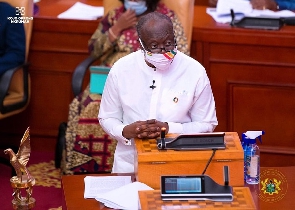 Finance Minister, Ken Ofori-Atta
Finance Minister, Ken Ofori-Atta
The Institute for Fiscal Studies, a policy think tank, has urged government to seek debt forgiveness from its major creditors to contain the country’s debt service expenditure, as the COVID-19 pandemic worsens an already fragile fiscal position.
A Senior Research Fellow at the policy think tank, Dr. Said Boakye, addressing a press conference on the IFS’ assessment of measures taken by government to tackle COVID-19, stated that the pandemic has worsened the country’s poor and fragile fiscal position.
Dr. Boakye argued that even before the pandemic struck, the sum of monies spent on compensation to public workers and expenditure on debt servicing bore semblance to the pre-HIPC era where these two practically consumed all of government’s domestic revenue.
Compensation to public workers and expenditure on debt servicing accounted for 99.7 of government’s revenue in 2019.
According to the Bank of Ghana, the country’s debt as at June this year stood at GH¢258.4bn which represents about 67 percent of GDP while servicing this debt is expected to cost the government in excess of GH¢31bn.
“Given the country’s poor and delicate fiscal position, which has dramatically worsened due to COVID-19 and some of the policy choices of the government, we recommend that the government should immediately seek debt reliefs, including debt forgiveness, from its major creditors so as to minimise the enormous size of the country’s debt service expenditure, which is consuming the biggest chunk of the country’s revenues (projected to be 71.6% of total revenue and grants in 2020),” the Senior Research Fellow at the fiscal policy think tank added.
Providing further justification on the need to reduce the debt burden, Dr. Boakye stated that there is the need to free up fiscal space to allow for spending on developmental projects.
“These two expenditure items box the government in, in the sense that they are extremely sticky downwards – they are very rigid or inflexible. What is more important is that they limit the ability of the government to spend on developmental projects, which are needed to help grow the economy and improve upon the socio-economic wellbeing of the people,” he said.
While Dr. Boakye noted that the structure of the country’s debt – made up of more commercial borrowing than non-concessional as it was in the late 90s — makes it more difficult to achieve forgiveness on the scale as witnessed during the HIPC era, he added the country must still try to explore whatever options there are.
Other measures
In addition to seeking debt reliefs, he advised the government to take steps to reduce the rate of growth in employee compensation in order to minimise its relative size over time.
Also, another solution to easing the tight fiscal space will be to boost revenue generation – which has already been impacted heavily by the slowdown in businesses as a result of the pandemic.
In the short to medium term, the IFS urged the government to look particularly from the extractive sector of the economy to increase its revenue generation.
COVID-19 fiscal response
Dr. Boakye described some of the measures the government introduced to deal with the effects of the pandemic as “fiscal populism” as they are blanket and not considerate of those who are in genuine need to cope with the aftermath of the economic restrictions.
“Refrain from engaging in fiscal populism despite the looming 2020 elections, in order not to compound the country’s fiscal problems. Indeed, a critical analysis of the economic history of Ghana reveals that fiscal populism has been one of the main causes of the country’s recurring fiscal and economic distress since independence,” he said.